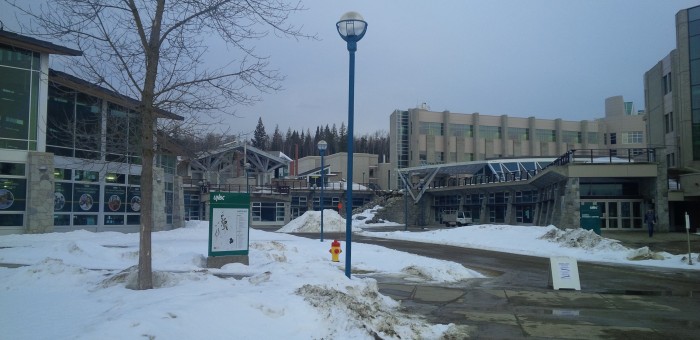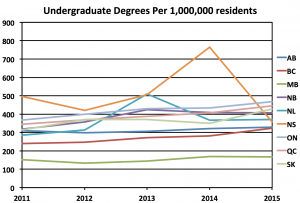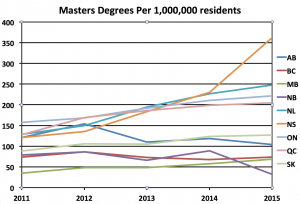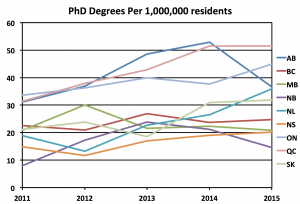On the need for more engineers to be trained in BC
At every level — undergraduate, master’s, and PhD, B.C. lags behind other provinces in terms of the number of engineers it graduates per capita.
Of the 9 provinces that offer engineering undergraduate degrees, BC ranks a dismal 8th. It ranks 7th in Masters and 6th in PhDs (see graphs below using data from Canadian Engineers for Tomorrow Share: Trends in Engineering Enrolment and Degrees Awarded 2011-2015).
Quebec and Ontario graduated 40% more undergraduate engineers per capita in 2015 than BC. They graduated 280% and 300%, respectively, more Masters Degrees per capita while Nova Scotia graduated 500% more per capita. And Quebec also graduates more than twice the number of PhDs per capita than BC.
In fact, BC is one of the lowest ranked jurisdictions in the world in terms of engineering PhDs awarded per capita. To compound this discrepancy further, BC has the strongest projected employment growth for engineers in Canada.
This is an unacceptable situation for a jurisdiction attempting to position itself as an innovator in the emerging 21st century economy. It’s particularly troubling as universities in BC are chomping at the bit to expand their offerings. For example, an exciting opportunity exists in Squamish to create a innovative centre for clean energy research, training and industry partnership. UNBC is also hoping to establish an engineering program to meet the demand for professional engineers in northern communities.
To pick up on this theme I asked the Minister of Advanced Education how her ministry was going to facilitate the development of these programs and increase the number of engineering graduates in British Columbia, and in particular, UNBC. As you will see from the video and text below, the BC Liberals were quite unruly during question period and had to be reprimanded by the Speaker a number of times.
Video of Exchange
Question
A. Weaver: At every level — undergraduate, master’s, and PhD, B.C. lags behind other provinces in the number of engineers it graduates per capita. Of the nine provinces that offer engineering undergraduate degrees, B.C. ranks a dismal eighth. It ranks seventh in master’s and sixth in PhDs. Quebec and Ontario graduated 40 percent more undergraduate engineers per capita in 2015 than B.C. They graduated 280 and 300 percent, respectively, more master’s degrees than B.C., while Nova Scotia graduated 500 percent more master’s degrees than B.C. Quebec has more than twice the number of PhD graduates. In fact, B.C. is one of the lowest-ranked jurisdictions in the world in terms of engineering PhDs per capita.
To compound this discrepancy further, B.C. has the strongest projected growth, for engineers in Canada. There are post-secondary institutions eager to fill the need. UNBC has been trying to get an undergraduate engineering program…
Mr. Speaker: Member, your question.
A. Weaver: …for years. The engineering department at UBC wants to build a tech campus in Squamish.
To the Minister of Advanced Education, Skills and Training, how is her ministry going to facilitate the development of these programs and increase the number of engineering grads in British Columbia?
Interjections.
Mr. Speaker: Members.
Answer
Interjection.
Hon. M. Mark: Sorry, what was that?
Interjection.
Hon. M. Mark: Yeah, exactly. It’s not you asking the question. I’m the one answering the question, through the Speaker.
Interjections.
Mr. Speaker: Members.
Hon. M. Mark: No, it’s okay. I’m used to this. I’m used to this circus on the other side. It has only been a week, but it’s been fun.
Interjections.
Mr. Speaker: Members.
Hon. M. Mark: I thank the member for Oak Bay–Gordon Head for the question.
Interjection.
Hon. M. Mark: Well, of course I do. I like to stand in this House as an advocate for post-secondary education. For the last 16 years…. In the first 21 days on the job, I had a chance to travel the province and hear from students and get to see STEM in action — science, technology, engineering and math.
We’re going to do something about this on this side of the House to send a message to students that we’re on their side, that we’re going to invest in their education. We’re going to invest in the tech sector.
We know that the tech sector is a $26 billion industry. Our friends on the other side of the House remind us that we’re not interested in jobs, but we need to make sure that we’re training people up. We’re going to make sure that those 100,000 people that are contributing to the economy are trained up in engineering. So we’re going to increase co-op placements. We’re going to increase apprenticeship placements. We’re going to make sure that the trade seats are relevant all across the province, not just select regions in the province.
I look forward to working with the member for Oak Bay–Gordon Head on increasing the seats in engineering in B.C.
Supplementary Question
A. Weaver: If ever there was any doubt why this boisterous bunch needed to be put in a time-out, today is the justification for that.
Interjections.
A. Weaver: In mathematics, hon. Speaker, “QED” is often used to demonstrate exactly what I was just saying.
UNBC has proven that if we train people in the north, they stay in the north. In fact, more than half of their 13,000 alumni live in the north, contributing to the society, culture and employment base. Engineering should be offered at UNBC. It would add to those figures.
I recognize that 16 years of rule by the Luddites opposite, who do not understand the importance of the new economy, abandoned rural B.C. and left them on the hook. They abandoned development in rural B.C….
Interjections.
Mr. Speaker: Member, please be seated for a moment.
Members, we are reminded that when someone is speaking, we will listen with good manners.
A. Weaver: My question to the Minister of Advanced Education, Skills and Training is: what is your ministry doing to ensure vibrant educational opportunities are available across all disciplines in our northern communities, in order to allow these communities to take advantage of the emerging opportunities in the 21st century economy that have been left out because of 16 years of incompetent rule by the B.C. Liberals?
Answer
Hon. M. Mark: I’m so pleased to hear a question about post-secondary advocacy in this House, because it’s about time that we have a government that’s going to advocate for the students all across British Columbia and make sure that we have those seats available. It is unacceptable that that government brought us to eighth place, in this province….
Interjections.
Hon. M. Mark: Pardon me? It’s exciting in here. I love the excitement. It’s about time that people are standing up for post-secondary education instead of standing in the way.
We’re going to get to increasing those seats across B.C., up in UNBC. We’re going to make sure that we’re investing in jobs in the 21st century. We’re going to make sure that we’re not standing the way by increasing debt and tripling tuition, like what was done under the last government in 16 years.
We are going to stand beside the students in British Columbia, and we made those measures, in the first 60 days of forming government, by reducing student debt, by making sure that we increase seats for students in the trade sector and the engineering sectors. We’re standing beside students in this province, and we’re sending a message that we are going to invest in them, not stand in their way.








2 Comments
Hydro maybe old but is still the most renewable, greenest, cleanest, cheapest, reliable, utility grade, energy in the world. Solar and Wind are TOXIC and wasteful when you NEED to add Batteries or FOSSIL FUELS to provide power when its dark and without wind! Just because you’re old, it doesn’t necessary mean you’re obsolete. Wind & Solar are great additions to Hydro, but they ARE NOT a REPLACEMENT, until there is a cleaner means of energy STORAGE than water. We might train a few Scientists and engineers here, but if you DON’T build the infrastructure to manufacture their innovations here, They and all their jobs will go to countries with Hydro or cheap fossil fuel energy. Just some common sense.
Where are they going to work after you shut down every project in BC?